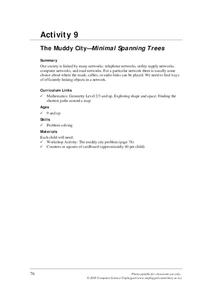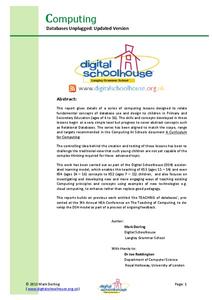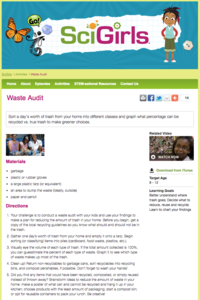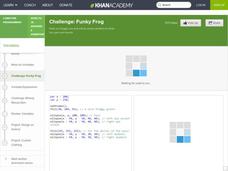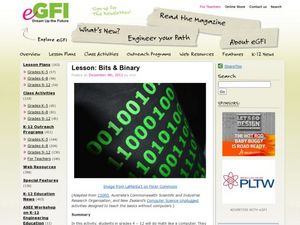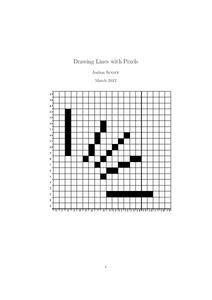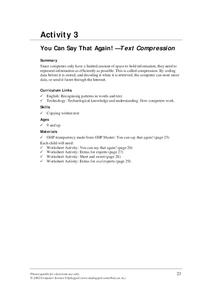Computer Science Unplugged
The Peruvian Coin Flip–Cryptographic Protocols
A digital flip. Introduce your classes to cryptographic protocols using and, or, and not gates. Groups create a complete circuit to convert a binary number into another one. This type of one-way function allows pupils to verify the...
Computer Science Unplugged
The Muddy City—Minimal Spanning Trees
What is the most efficient way to ensure everyone is connected? Individual pupils determine the least expensive route to pave roads in a fictional city. In doing so, they learn to find the minimal spanning tree for the situation. They...
Computer Science Unplugged
Twenty Guesses—Information Theory
How do we determine how much information to include and what can be left out? By playing a game of 20 questions, the class generates the best strategies for finding a number. They then move on to guessing the next letter in a short...
Computer Science Unplugged
Battleships—Searching Algorithms
How does a computer perform a search in order to find data? The lesson begins with a demonstration on finding one number out of 15. Pairs then play three games of Battleship by using different search techniques. The lesson plan finishes...
Computer Science Unplugged
Computing: Databases Unplugged
How do databases store and retrieve information? The activities in the resource provide fundamental concepts of databases by introducing an approach that teaches the basics without using computers. The pupils act as the actual data that...
Computer Science Unplugged
Lightest and Heaviest—Sorting Algorithms
How do computers sort data lists? Using eight unknown weights and a balance scale, groups determine the order of the weights from lightest to heaviest. A second worksheet provides the groups with other methods to order the weights. The...
Computer Science Unplugged
Count the Dots – Binary Numbers
Did you know you can send a message using only zeroes and ones? This interactive resource presents an introduction to binary numbers. Through code cards, pupils learn to convert binary numbers to decimal numbers.
PBS
Parachute Parade
Sail to the ground with a parachute activity! Kids construct parachutes out of household items and a toy figure, after brainstorming the best way to reduce drag. Once they test their parachutes, they can adjust their projects to optimize...
PBS
Waste Audit
Does everything in the trash can belong there? Conduct a waste audit with your class by collecting a day's worth of garbage, separating it into recyclables, non-recyclables, or food waste, and properly distributing what they find into...
PBS
Heart to Heart
Study heart health and math in one activity. After measuring their resting heart rates by finding the pulse in their wrists, learners build a stethoscope to listen to their heart rate, and note the differences between the two methods.
PBS
Robot Body Language
How can you tell what someone is feeling when they aren't saying a word? Explore non-verbal communication with an activity based on Cynthia Breazeal's work with expressive robots. One learner puts a bag over his or her face and uses body...
Mojang
Minecraft – Pocket Edition
You don't have to be a Minecraft wiz to know that this app has great playability for your learners! As afterschool programs and classroom projects around the world demonstrate, this game goes well beyond placing blocks and traditional...
Sprite Box
Lightbot Jr 4 Coding Puzzles
Learning how to write computer code has never been so much fun! Given control of their very own robots, children create simple programs in order to solve a series of challenges and develop their problem solving skills.
TED-Ed
What is the World Wide Web?
Did you know that the World Wide Web and the Internet are not the same thing? Did you know that Tim Berners-Lee is considered the father of the Web? Networks, web servers, web hosts, website addresses, domain names, web languages,...
Khan Academy
Challenge: Funky Frog
You haven't seen any large-mouth frogs around have you? Hopefully, there will be lots of them as your young JavaScript coders complete this task to create a frog with a wide mouth and use variables in a way that connect the frog face...
Two Lives Left
Cargo-Bot
What would you think of an app that provides a creative introduction to an important 21st century skill, challenges learners at many levels, and is an addictively, fun game? Did we also mention it was free? We think you will find all...
Krzysztof Haft-Szatynski
Move the Turtle
Turtles are not known to be speedy movers, but have you ever tried to get them to move in a specific direction? How about getting them to move in a perfect circle? With this app, young computer programmers have to be on their toes to...
eGFI
Bits & Binary
Youngsters love to write on their hands, and in this fabulous activity they are actually asked to. Using numbers written on the tips of their fingers, they will learn how the binary number system works. This hands-on activity is a...
TryEngineering
Search Engines
Learn how to find things quickly and efficiently on the Internet. The lesson teaches how search engines work and how to efficiently use them. It includes an activity where groups develop search queries to find sites using given criteria.
TryEngineering
Circuits and Boolean Expressions
Teach basic logic using Boolean operators. Young computer scientists learn about the operators NOT, AND, and OR, and how they can be expressed using Boolean notation, logic gates, or truth tables. Along the way, they learn about half...
Computer Science Unplugged
Harold the Robot — Thinking About Programming Languages
Get young programmers thinking about programming languages with an activity that asks class members to craft directions for one person (teacher, another adult, or a class mate) acting as a robot. Participants direct the robot to...
Computer Science Unplugged
Drawing Lines with Pixels
How do the computers keep it straight? Using the provided algorithms, class members draw a line and a circle using pixels. They then check the drawings using a straight edge and compass to determine the accuracy of their drawings.
Computer Science Unplugged
Sharing Secrets—Information Hiding Protocols
Did you know that you can find the average age of a group of people without anyone having to real their age? This resource provides directions for way to do just that. After the activity, class members read a short passage that provides...
Computer Science Unplugged
You Can Say That Again! – Text Compression
Compression, the process computers use to store information, is the focus of a resource that presents two different stories that describe the concept of compression by eliminating repeated letters and replacing them with a pointer. The...



